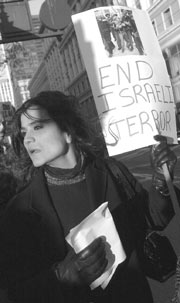I UNDERSTAND the appeal of seeing Israel as a symbol of old-school-style imperialism, just as I understand the appeal of seeing the World Trade Center as a symbol of capitalist arrogance and dominance.
But after spending two years in Israel—one during the recent intifada—and then moving to downtown New York just before Sept. 11, I also see the terrible danger of understanding the world in simplistic ideological terms.
Whatever the World Trade Center symbolized (world trade, for starters), what was destroyed there were thousands of beautiful, small, precious lives: Argentinean busboys, suburban secretaries who painted watercolors of the sunset from their conference rooms, my friend Sara’s 26-year-old brother.
And only in some kind of Cultural Studies 101 wet dream are Palestinian attacks on Israel blowing up tyranny, ignorance, and oppression like great resistance movements do; in reality, they are blowing up my friends, newborn babies, elderly men riding the bus to the market. They are blowing up the powerless and innocent, and they are blowing up the sanctity of life. By having soldiers who look like civilians execute attacks against other civilians without formally declaring war or making demands, Palestinian terrorism releases war from a separate realm governed by at least a modicum of civilizing rules and makes it into a way of life.
When Palestinian terrorists strap bombs onto their ambulances, they invite suspicion that all of their ambulances—most of which really carry sick people—may be harboring bombs. When they wire the bodies of young women and men with explosives, they are literally dehumanizing their people, turning them into weapons that can blind or orphan a child.
Terrorism makes further dehumanizing behavior—rounding up Palestinians, searching them, and denying them entry to Israel— a reasonable, if regrettable, means of self- defense. There are many strategies for bringing about an end to oppression; the best ones elevate the dialogue. The strategy the Palestinians are employing should give lefties a lot more cause for pause than it appears to. The murder of civilians—”noncombatants”—violates the Geneva Conventions. Palestinian terrorists have perpetrated over 11,000 attacks on noncombatants over the last 18 months, killing 427 Israelis and wounding 3,654 more.
I am astonished that International Socialists—whose members boycott products that have been touched by corporate greed and won’t eat foods that may have caused animal suffering—can without qualification join with a people who were filmed cheering in the streets when the planes hit the World Trade Center, whose political organizations not only fail to criticize firing on a 12-year-old’s Bat Mitzvah party but rush to proudly claim responsibility.
Many movements have violent and extremist wings, but show me the moderate branch of the Palestinian Liberation Organization, the folks making reasonable righteous demands. I hear a message of peace made on behalf of the Palestinians from the International Socialists, kids on American college campuses, from Michael Lerner, the editor of the Jewish liberal journal Tikkun, and from Edward Said, a Western-educated intellectual who occasionally pays a visit to the Middle East to get his picture taken throwing stones at Israelis.
BUT WHAT DO the actual Palestinians say? They have refused every offer for peaceful coexistence from the one proposed by the United Nations in 1948 to the one Ehud Barak offered in 2000. This refusal is not accompanied by a counteroffer, an opening for dialogue, but by violence. This confirms Israelis’ fears that Palestinians want only to destroy them. Israelis see that the second intifada is different from the first because the Palestinians now have guns, given to them by the Israeli government, which also paid the Palestinian Authority millions of dollars in aid. Israelis see that after 10 years of peacemaking, their college campuses started talking post-Zionism and their schools began including the Palestinian struggle in textbooks, while Palestinian schools continue to teach from books full of vile and violent misinformation; Holocaust denials and blood libels, maps with no mention of Israel. Even the most liberal of Israelis—Benny Morris, for instance, who pioneered post-Zionism—have come to doubt whether “oppression” is all the Palestinians are trying to bring an end to.
Palestinian suffering grieves me horribly; it is a pox on Israel and a pox on the world. But it has not come about because of an Israeli plot to tyrannize and colonize Arabs. The socialists who advocated for a Jewish nation at the turn of the century were more than happy to keep it in Russia; the idea of a literal return to Zion was considered reactionary, utopian, and stupid. As Europe became increasingly hostile to Jews, and there didn’t seem to be anywhere else to go, the idea gained support. All debate ended after the Holocaust, when the remaining survivors faced severe immigration restrictions to America and the ones who returned to Europe were being persecuted in full force once again. The British separately promised Palestine to the Zionists and to the Arabs (in return for military support) and left the two to hash it out.
The Palestinians have borne the brunt of the suffering that this unhappy situation generated; Israel is to blame as is its own incompetent leadership and the Arab world which refuses to accept Palestinians into their borders and supports them only when it is politically expedient.
Their suffering is deeply intertwined with Israel’s suffering. They cannot expect self-determination and freedom if they refuse to recognize the right of Israel to the same. They cannot expect to have their decency as humans honored if they do not challenge political organizations that murder teenagers in their name.
To support the Palestinian cause as it has been fought in the last 18 months without even moderate criticism, to present raids on Palestinian territories as decontextualized unprovoked affairs, will not bring about a better world. The situation in the Middle East is more complex than a rudimentary glance at the symbols—the American tanks here, the non-Western people there—suggest. To fail to acknowledge this complexity is to love ideology more than human life.
To the socialists on their solidarity tours of Palestine, I ask: Would your brothers in struggle seem as righteous if they were in your backyard full time? Because when you empower them with a state, grant them legitimacy without asking them to take responsibility for the atrocities they perpetuate, they will end up in your backyard. They have many strongly held views, not just about Israel, but about the Western world that bred your tolerance and pluralism. Why don’t you strike up a conversation with the head of the Tanzim about the role of women in the West or the role of the press or what should be taught in schools? When you find you have issues you disagree on, ask yourself how you think they will try to resolve those differences if their current strategy succeeds?
Samantha M. Shapiro was a senior writer for The Stranger for two years. she’s now a freelance writer in New York. Her work has appeared in The New York Times Magazine.





